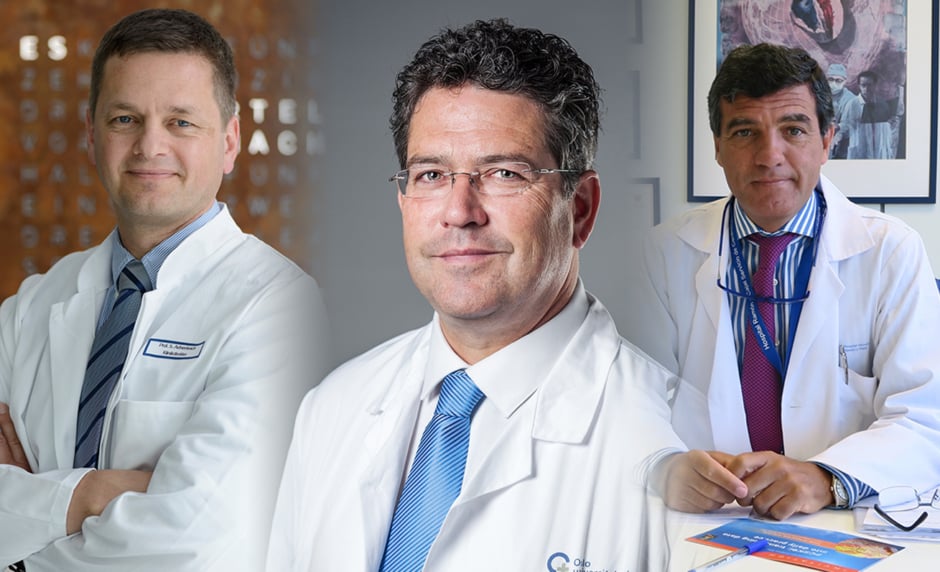In this round table interview, we gather the opinions and perspectives of Professors Atar, Achenbach, and Zamorano, who have all served on the ESC Board, discussing why they entered the field of cardiology and their roles within the ESC.
Prof Stephan Achenbach | University of Erlangen, Erlangen, Germany; President of the ESC
Prof Dan Atar | University of Oslo, Oslo, Norway; Past Secretary/Treasurer of the ESC
Prof Jose Zamorano | University Complutense, Madrid, Spain; Past Vice President of the ESC
![]()
What fascinates you the most about cardiology, and why did you decide to have a career in this field?
Prof Atar: We cardiologists are proud to have chosen one of the most dynamic and innovative fields of medicine. Few disciplines have encountered similar progresses in disease detection and in therapies, both pharmacology-based and interventional alike. During the past 40 years, our field has gone through achievements that have revolutionised medicine to a great extent.
Prof Achenbach: First of all, cardiology is extremely interesting from a physiology perspective. We have an organ that is constantly moving, with a complex interplay of muscle, valves, vessels, blood supply, and electrical currents. In addition, we can help not all, but many patients very rapidly and effectively, and get them to move on and continue leading a normal life. As an interventionalist who also practices imaging and general cardiology, I like the balance of manual work and ‘intellectual’ challenges; but please do not get me wrong, there is a lot of intellect in interventional work also.
Prof Zamorano: I am not the typical example of a person that was thinking of becoming a doctor since childhood. I was much simpler and wanted to become a football player. But after finishing school, I decided to enter medical school and become the first doctor in my family. Once I entered medical school, the heart became the most fascinating organ for me. From physiology to pathology, it is was all really intriguing, and still makes me happy whenever I research, diagnose, or treat a patient. Moreover, it is a privilege that we as doctors are able to help other people every day. In simple words, being a doctor is simply not the same as working as a doctor. I love being a doctor and feeling that we can help many people; this happens in our profession daily and we feel privileged.
Could you tell us about your most recently published paper, and the impact you hope the conclusions to have on the cardiology community?
Prof Atar: In my most recent publication, the title says it all: “The Myth of Stable Coronary Heart Disease.” The article explains that the term stable is a misconception, and it should be named ‘chronic’ instead, to reflect the progressive nature of disease. Shortly after this publication, the European Society of Cardiology (ESC) guidelines used the same terminology.
Prof Achenbach: At the moment, we are publishing mainly around 1) risk stratification by cardiac CT, helping to avoid individuals getting a myocardial infarction and 2) the use of non-invasive imaging to make interventional procedures more effective and safer. This will help patients who undergo procedures such as percutaneous coronary intervention (PCI) or transcatheter aortic valve implantation (TAVI) to get better results at lower risk. Our contributions may be small, but overall, everyone who contributes helps to move the field further.
Prof Zamorano: My research life has been committed to improving diagnostic methods in cardiology and managing cardiovascular risk factors. My last contribution related to the new classification of tricuspid regurgitation (including the ‘massive’ and ‘torrential’ concept). Indeed, this implies not only a more accurate diagnosis but also aims to improve the prognosis of such patients. The new percutaneous approaches to valve diseases in cardiology implies a more accurate diagnosis and also aims to establish the optimal timing for treatment. I do believe that a more accurate diagnosis followed by earlier treatment will benefit our patients.
What does your role on the European Society of Cardiology (ESC) Board entail, and what have you achieved so far in this position?
Prof Atar: I have served our society in a variety of elected positions and have enjoyed the various aspects to interact with colleagues. My role as Vice-President for National Affairs took me to 43 different national congresses and so-called leadership meetings, where we had a chance to discuss the future input of that particular national society to the ESC as an overarching multinational organisation, and I then delivered the specific wishes from the national leaders back to the ESC. In my current role as Treasurer/Secretary of the society, I had the opportunity to monitor the growing activities across various constituent scientific bodies. All of these tasks were extremely rewarding and provided a lot of personal learning.
Prof Achenbach: I am currently the president-elect and, as of September, I will be the president of the ESC for a period of two years. It will be both a challenge and a privilege to be at the front of such a distinguished group of colleagues and staff members.
In previous roles, among other things, I chaired the programme committee for the ESC Congresses 2017 in Barcelona and 2018 in Munich, and I had responsibilities for ESC global affairs, the website, and a rebranding programme.
Prof Zamorano: After reading this question, I realised that ESC has been quite relevant in my personal life, my family, and my career.
I started as a member of the Scientific Committee of the European Association of Echocardiography (EAE) with Prof Fausto Pinto (2001–2004), Member of the Accreditation Committee of the EAE (2003), Member of the Guidelines Committee chaired by Prof Silvia Priori (2004–2008), elected Councillor of the ESC with Prof Kim Fox (2006–2008), elected President-elect of the EAE (2006–2008), Secretary/Treasurer of the ESC with Prof Roberto Ferrari (2008–2010), President of the EAE (2008–2010), Chair of the ESC Guidelines Committee (2012–2016), Chair of the ESC Global Affairs Committee (2016–2018), and I currently am Vice-president of the ESC. A lot of time and effort has been committed. I could list personal contributions but will refrain from it as I never seek recognition for teamwork. I do not recall any sad memories in my ESC history, they were all good moments. I only remember having excellent and brilliant cardiologists around me driving me to improve. I think that in life it is crucial to never become complacent, in fact if you feel that you are the brightest in the classroom what you need to do is change classrooms. This feeling never happened to me at ESC, I was always surrounded by brilliant, committed and hardworking people. I found some friends at ESC, cardiologists and staff, and I feel that ESC will always be a part of my life. Even if I did mange some great projects, new ideas, books etc., I have the feeling that I always received much more than what I gave and I am forever grateful.
It has been decided to move the ESC Congress 2020 into a virtual meeting this year. What do you believe to be the advantages of an online congress?
Prof Atar: There was undoubtedly a disappointment in the ESC Board when we had to take this decision. Nothing can replace the buzz of a face-to-face meeting. There are a few advantages in substituting a live congress with a virtual event, and we shall make the best of it. However, I would say that the excitement of meeting colleagues face-to-face and performing live scientific discussions is never the same in a virtual meeting.
Prof Achenbach: It will allow more individuals to connect and participate, from all around the world, so that is a major benefit. We can reach further but it is also necessary that we adapt our programme and content to that new situation. The ESC team has been performing marvellous work to achieve that.
Prof Zamorano: Life is digital. The world is not changing, is has already changed. Learning and education goes hand in hand in a different way nowadays. There is no doubt that we need to move towards this new concept. What should not be done is simply replicating the usual ESC Congress to an electronic format. I am happy to see that this is not the spirit of the ESC Congress 2020. We should also not expect attendees to sit in front of their computers for 3 days and learn. Again, this is not the spirit of the meeting. Therefore, ESC will again be leading a new trend of education and I am sure it will be a great meeting and boast a new way of teaching.
‘Spotlight 2020: The Cutting Edge of Cardiology’ will be the overarching theme of the ESC Congress. How have recent advancements in technology helped research and patient care?
Prof Atar: New developments in therapy are constantly evolving, and hence the title of this year’s spotlight. We will be proud to feature some of the breakthrough findings in cardiovascular science.
Prof Achenbach: There are so many developments, reaching from small interfering RNA to catheter-based treatment techniques of valve disease and smart watches to follow the heart rhythm. We constantly have new opportunities to diagnose and treat, and need to carefully evaluate what is good, useful, and has a benefit in the long run.
Prof Zamorano: Cardiology as a specialty has always been in nexus with technology. New diagnostic methods, innovations in therapy, or research are part of the DNA of cardiologists, it is something that attracts our professionals. Therefore, the topic is quite pertinent, especially nowadays with all the changes that suddenly appeared in our medical profession as a result of the COVID-19 pandemic. During the last few years, we have discussed digital cardiology manny times and now COVID-19 has, in an abrupt way, moved all of us towards digital medicine.
The mission of the ESC is: “To reduce the burden of cardiovascular disease.” In your opinion, what areas of cardiology need the most support at this time?
Prof Atar: Cardiology encompasses all sub disciplines, each of which has an enormous impact on health, and I therefore would not emphasise one of those areas in preference of the others. The spectrum goes from prevention, to diagnosis, to therapy.
Prof Achenbach: We need to address inequalities and make sure that, if in any way possible, all individuals and patients in Europe and beyond get access to those diagnostic and therapeutic measures that will reduce mortality and morbidity. Singling out a certain area of cardiology that needs particular attention, whether intervention, arrhythmias, heart failure, or other, would not be adequate since there are constant improvements in all of these areas that need to be made known and implemented. However, the ESC also has a particular role in trying to influence health policies towards healthier behaviour, and to make sure that funding for cardiovascular research does not fall even more behind that of other diseases such as cancer. Cardiovascular disease remains the most frequent cause of death and efforts to fight cardiovascular disease must not decline.
Prof Zamorano: It is difficult to state a specific area. Obviously, all areas, but if you ask me what I did in my own department in the last months, I can answer that we changed many things. We have invested a lot into digital technology and into changing our approach to treat and control our patients. We have a new outpatient approach; we created the digital platform ECardio where we receive all our new patients and distribute them to the proper path from that platform. We are now also creating a digital cardiology department, akin to a virtual hospital. We also incorporated a new format of teaching courses where the speakers do not use any slides and the attendees are the real relevant people. Teaching today is simply answering what the attendees want to know, not what the teacher wants to show. Now the attendees ask their topic-based questions via chat and all that the faculty need to bring to the session is their brain. We have video chats (attended virtually from America to Australia) and soon we will host our Valve Fest in October, again with this new modality of virtual teaching.
The ESC produced a guidance document for clinicians to follow to provide expert care for patients with cardiovascular disease during the COVID-19 pandemic. Could you summarise the key recommendations?
Prof Atar: One of our greatest concerns is the delay of cardiac patients in access to healthcare during the COVID-19 pandemic. Cardiovascular disease manifestations often require immediate attention, a fact that must not be forgotten in the midst of the challenge of infection risk.
Prof Achenbach: It is very important that the ‘usual care’ for heart patients is not interrupted and remains available at a low threshold, even during times of this or other pandemics; certainly a lesson we have learned for the future. Media of all sorts have led to a substantial amount of fear in the nonaffected population that going to a hospital will put them at risk of contracting COVID-19. We have seen too many patients presenting too late with severe heart conditions.
Prof Zamorano: Well I was not involved in the production of the document so I cannot comment on that specifically, but again the consensus here is that from the beginning ESC wanted to help. We were heavily involved in treating these patients at our hospital. More than 3,000 patients were admitted and at the peak we had more than 800 patients coming in daily to the Hospital. No doubt this was a horrible situation, but also included many benefits. I saw many people come together with incredible solidarity trying to help and acting as a true team. There was no personalism, in the stock market, the decreasing values included personal recognition and those increasing were group motivation, inclusiveness, discovering new values and talented people, and demonstrating that leaders reflect the example that they show and that behavioural example legitimatises them as true leaders. This is also something that was shown to me from the ESC in all activities; no personalism, it is about teamwork and growing together.
Guanylate cyclase stimulators are increasingly being seen as the future of heart failure treatment; what potential do you believe they truly have?
Prof Atar: As a rational and truly innovative mechanism to ameliorate heart failure, there is a great potential in pharmacological guanylate cyclase stimulation. The newest results support this notion, based on randomised experience against contemporary state-of-the-art heart failure therapies.








